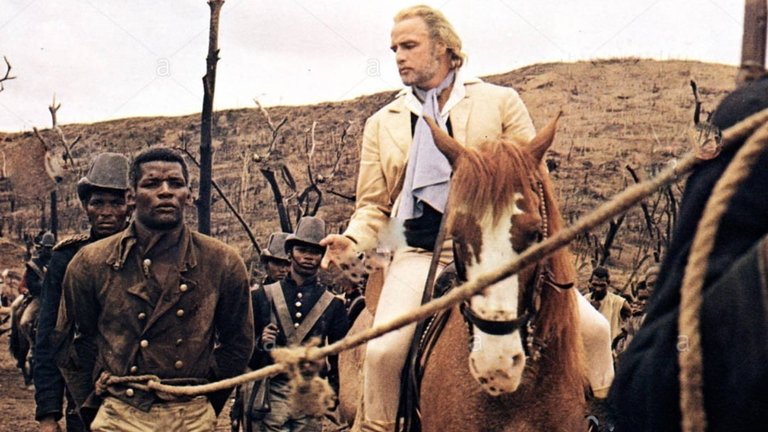
The 1960s, especially its latter part, were the golden age of political cinema worldwide. Many talented directors were producing memorable films that reflected the social and political turmoil of the era, often showcasing their thoughts on the causes of global problems. The majority of these filmmakers leaned left-wing, and their ideologies were apparent in their works.Among these influential figures was Italian filmmaker Gillo Pontecorvo, whose 1966 docudrama The Battle of Algiers remains a seminal work in political cinema. Three years later, Pontecorvo directed another significant film, Quiemada, also known as Burn!, which further exemplifies his commitment to exploring themes of colonialism and revolution.
Unlike "The Battle of Algiers," which reconstructed real and recent events, "Burn!" is a work of fiction set in the more distant past. The film's plot takes place in the 1840s on the fictional island of Quiemada in the Antilles, which is under Portuguese colonial rule and relies on sugar plantations worked by black slaves. Sir William Walker (played by Marlon Brando), a British secret agent, arrives to stir up an uprising. After several previous candidates fail, he recruits José Dolores (played by Evaristo Márquez), a poor but resourceful and intelligent black porter. Walker tricks Dolores into robbing a bank and then gives him weapons to fend off the soldiers pursuing him, and, later even more weapons to protect villagers that give him shelter. Dolores begins to lead an army of runaway slaves in the mountains and proves to be a charismatic and effective leader. As his forces grow, the Portuguese rule weakens, and Walker convinces the white plantation owners to join the revolution and declare independence. The new government, led by the idealistic but ineffective Teddy Sanchez (played by Renato Salvatori), abolishes slavery and convinces Dolores to disarm. However, the government is forced to sign a treaty with the British granting them lucrative concessions and privileges. Walker leaves the island but returns years later, working for the London-based Antilles Royal Sugar Company to protect their plantations on Quiemada from another uprising. Walker, now a military advisor, must face his old friend Dolores in increasingly bloody and destructive campaigns.
The film's setting might be in the past, but most of the audience during the time of the premiere would have easily recognized the allegory of the events in the present day. The film was made under the shadow of the Vietnam War, which had become increasingly unpopular in America and the rest of the world. Many in the audience began to sympathize with the Viet Cong and similar Third World revolutionary movements fighting foreign colonisers, neocolonialist superpowers, and their local collaborators. "Burn!" spells out its displeasure with American meddling in Third World affairs by naming the main character after William Walker, the infamous American adventurer who, in the 1850s, worked at the behest of Southern slaveowners to conquer and briefly rule Nicaragua (an event covered by Alex Cox in 1987 film Walker). The character of José Dolores is named after José Dolores Estrada, the Nicaraguan national hero who successfully fought against Walker.
Marlon Brando’s portrayal of William Walker stands out as one of his most compelling performances, despite playing a character that would typically be viewed as villainous. Brando approached the role with enthusiasm and even contributed financially to the film's production when it was under threat of being shut down. In his memoirs, he later described Walker as one of his favourite roles throughout his illustrious career. Brando's exceptional talent shines through as he imbues Walker with nuance and complexity; rather than being purely malevolent, Walker emerges as a pragmatic professional executing his duties with intelligence and cynical insight. It is only towards the film's conclusion that he reveals a flicker of conscience and makes a desperate attempt to save his friend.
Pontecorvo’s background in Italian neorealism influenced his choice of casting non-professional actors alongside established stars like Brando. His collaboration with Evaristo Márquez—an illiterate Colombian herdsman selected for the role of José Dolores—proved successful; despite his lack of formal training, Márquez delivers a convincing performance that captures the spirit of revolutionary leaders akin to Che Guevara.
With a relatively substantial budget at his disposal, Pontecorvo filmed Burn! across various locations including Colombia, Morocco, and Cinecittà studios in Rome. The film features numerous impressive mass scenes that reflect Pontecorvo's ambition and vision. However, there are moments when he appears overly enamoured with certain sequences—particularly those depicting black slaves and their culture—resulting in sections that resemble an ethnographic documentary rather than a cohesive narrative film. This tendency can cause pacing issues within Burn!, compounded by an occasionally uninspired musical score from Ennio Morricone.
Despite these criticisms, Burn! leaves a strong overall impression on its audience. Even those who may not typically gravitate towards historical epics or Pontecorvo's leftist ideologies are likely to find enjoyment in Brando's masterful performance and the film's rich thematic explorations.
RATING: 7/10 (+++)
Blog in Croatian https://draxblog.com
Blog in English https://draxreview.wordpress.com/
InLeo blog https://inleo.io/@drax.leo
Hiveonboard: https://hiveonboard.com?ref=drax
InLeo: https://inleo.io/signup?referral=drax.leo
Rising Star game: https://www.risingstargame.com?referrer=drax
1Inch: https://1inch.exchange/#/r/0x83823d8CCB74F828148258BB4457642124b1328e
BTC donations: 1EWxiMiP6iiG9rger3NuUSd6HByaxQWafG
ETH donations: 0xB305F144323b99e6f8b1d66f5D7DE78B498C32A7
BCH donations: qpvxw0jax79lhmvlgcldkzpqanf03r9cjv8y6gtmk9
Posted Using InLeo Alpha